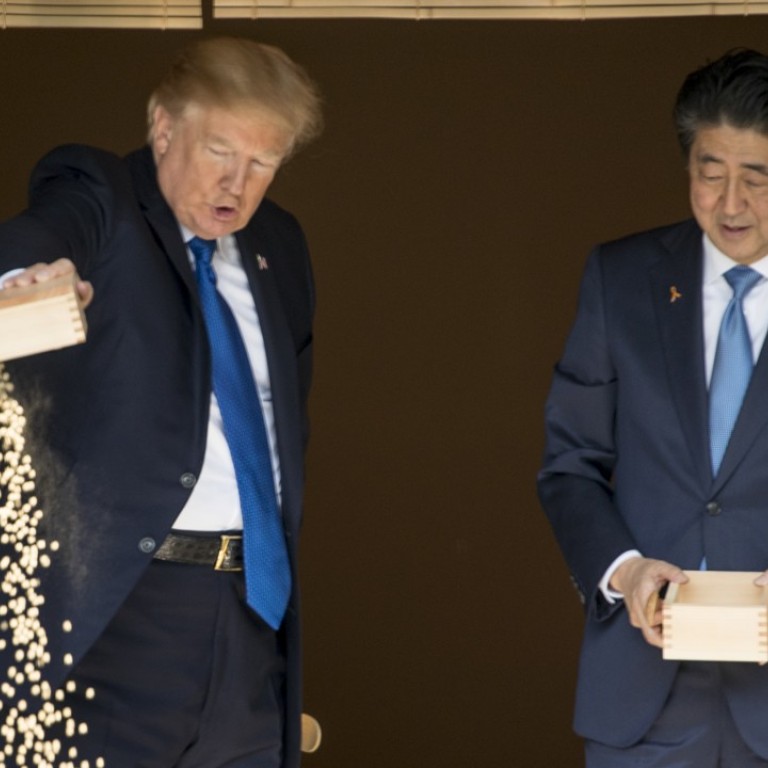
With a friend who trumps Japan’s economic recovery, does Shinzo Abe really still need an enemy?
- This was supposed to be the time when five years of economic stimulus translated into real salary increases, but that’s not happening
Shinzo Abe’s bromance with Donald Trump is experiencing a serious rough patch.
The tension between the leaders of Japan and the US is building over slowing growth in Asia’s second-biggest economy.
Six months ago, Prime Minister Abe basked in headlines about Japan’s longest recovery since the 1980s and booming stocks. Then came President Trump’s trade war. As 2018 enters the home stretch, the narrative is back on weakening growth, stubborn deflation and renewed central-bank action.
The Bank of Japan admitted as much last week when it delayed its timeline for 2 per cent inflation for the umpteenth time. Retail sales are slowing, falling 0.2 per cent in September from the previous month. And the stock rally Abe once touted has fizzled. The Nikkei 225 Stock Average is down 8 per cent in the last 30 days alone.
That mean 2019 will be a much tougher year than Abe envisioned when he won a third term in September. It means, as analysts at Societe Generale predict, a return to increased fiscal stimulus. It means Abe’s plan to increase the sales tax to 10 per cent from 8 per cent next year looks terribly ill-timed. It also could mean the BOJ is back in the easing business.
The big focus in Japanese markets has been the odds of BOJ “tapering.” Since April 2013, Governor Haruhiko Kuroda pushed Tokyo’s quantitative easing into uncharted territory. The resulting 30 per cent drop in the yen helped stimulate export giants and, by extension, gross domestic product.
Talk about buyer’s remorse. No world leader visited Trump Tower sooner and with more enthusiasm in November 2016 than Abe
The tapering never came. The occasional move to recalibrate bond purchases, sure. But the BOJ heads towards 2019 owning nearly half of all outstanding Japanese government bonds and more than 75 per cent of exchange-traded funds. Odds are, Kuroda’s next move could just as easily be to step on the monetary gas as tap the brakes.
Uncertainty abounds, as Trump threatens to double the US$250 billion of Chinese goods he’s targeting with taxes to at least US$500 billion. He is flirting with 25 per cent levies on imports of cars and auto parts, a devastating prospect for Japan.
Talk about buyer’s remorse. No world leader visited Trump Tower sooner and with more enthusiasm in November 2016 than Abe.
At his meeting with Trump nine days after America’s shock election result, Abe declared: “I am now confident that President-elect Trump is a trustworthy leader.”
The vast majority of Japan’s 127 million people would disagree. Abe hasn’t publicly broken with Trump, fearing his wrath on Twitter and in global forums. But Trump’s policies are now running directly afoul of their interests.
This was the year, after all, when five-plus years of historic stimulus was supposed to finally give long-suffering salarymen and women hefty raises. Not the odd bonus, but official salary bumps on which households can rely.
Well, forget that. In fact, Japan Inc icons have growing incentives to cut bonuses, trim staff and invest even less in 2019 as headwinds zoom their way. And that’s just the fallout from Trump’s trade war. Bundle Abe’s consumption tax hike on top of taxes on trade and Japan is looking at a dismal 12 months.
Tokyo has options, of course. But increased government borrowing and even easier monetary policy will just resign Japan to another five or 10 years of trying to dig its way back to normalcy. At some point, credit rating agencies will notice that Japan’s US$10 trillion debt is colliding with fast ageing population, one-fifth of which is 70 years or older.
Lots of fresh uncertainty is clouding the longer-term trajectory. But at least this much is clear: Japan’s recovery is getting trumped as we speak.
William Pesek is a Tokyo-based journalist and author. He has written for Bloomberg and Barron’s

